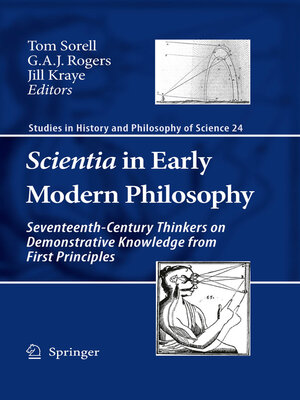Scientia in Early Modern Philosophy
ebook ∣ Seventeenth-Century Thinkers on Demonstrative Knowledge from First Principles · Studies in History and Philosophy of Science
By Tom Sorell

Sign up to save your library
With an OverDrive account, you can save your favorite libraries for at-a-glance information about availability. Find out more about OverDrive accounts.
Find this title in Libby, the library reading app by OverDrive.



Search for a digital library with this title
Title found at these libraries:
| Library Name | Distance |
|---|---|
| Loading... |
Scientia is the term that early modern philosophers applied to a certain kind of demonstrative knowledge, the kind whose starting points were appropriate first principles. In pre-modern philosophy, too, scientia was the name for demonstrative knowledge from first principles. But pre-modern and early modern conceptions differ systematically from one another. This book offers a variety of glimpses of this difference by exploring the works of individual philosophers as well as philosophical movements and groupings of the period. Some of the figures are transitional, falling neatly on neither side of the allegiances usually marked by the scholastic/modern distinction. Among the philosophers whose views on scientia are surveyed are Hobbes, Descartes, Spinoza, Gassendi, Locke, and Jungius. The contributors are among the best-known and most influential historians of early modern philosophy.







